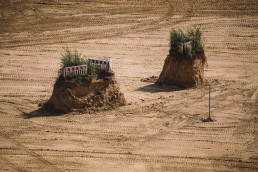
The appropriation of space by creative pioneers – how is that possible, how does it work in the Ruhr region?
The appropriation of space by creative pioneers – how is that possible, how does it work in the Ruhr region? Svenja Noltemeyer (Büro für Möglichkeitsräume, Urbanisten e.V.), David Coerdt (Pandora2.0) and Frank Münter (Transition Town Essen), three activists who have been taking responsibility for brownfields and promoting a do-it-yourself mentality in urban development for many years, discussed this in the context of the lala.ruhr-festival.
The starting point of the debate: the project idea “land for free”, launched almost 20 years ago in the Ruhr area but never implemented, which was supposed to enable experimental, creative-entrepreneurial projects to revitalise brownfields in the then still shrinking Ruhr area. Outside of building regulations and restrictions, intermediate sites were to be made available to space pioneers with innovative ideas in order to achieve social and economic effects. An idea that never officially came to fruition – and is now being implemented in a do-it-yourself manner in various places in the Ruhr region.
Change through culture, culture through change
Spatial planner Svenja carries on the core of the idea and creates frameworks for the implementation of ideas with her Büro für Möglichkeitsräume and the Dortmund Urbanists. Through networking, cooperation and support with funding applications, people in the city should be enabled to actively shape their environment.
“Cities worth living in are made by local people. But it is very difficult to get through the jungle of authorities alone. In order to continue the strategy of the European Capital of Culture RUHR.2010 ‘change through culture, culture through change’, the city of possibilities and creativity, better structures are needed in the Ruhr region. It must be made easy for people to get involved in their city.” (Svenja)
The self-growing city as a DIY proposition
David, who has rented an area for Pandora 2.0, has been working in the north of Dortmund for some time now, where a “self-growing city” is to be created from sea containers under the aspects of upcycling and climate neutrality. Thus, disused festival decorations and recycled building materials will be used to design the communal areas, which will be transported by bicycle trailer.
“Pandora2.0 is a place where everyone can develop freely. A place for culture, exchange and encounters that can grow according to people’s needs. Not a party space, but a networking place for developing and advancing common ideas and projects, where free spirits meet.” (David)
Pandora2.0 is supposed to develop further on the rented former commercial site through the constant docking of further containers – not an easy undertaking in view of the legal situation in Germany. At the moment, David is working as a private person to create legal certainty in terms of a fixed, commercial use and a concession for events, which should bring financial security.
Doers and enablers
Frank comes from the “community garden corner” and, together with his fellow campaigners in Essen-Altenessen, has joined the worldwide Transition Town movement, which wants to encourage as many people as possible to act and manage differently in their environment. In Altenessen, he and his team are transforming derelict, littered plots of land into green gems using mobile garden elements such as raised beds.
“We help with knowledge, heart and hammer and as a Transition Town we want to upgrade our neighbourhoods, fill dreary, loveless, neglected places with positive life again.” (Frank)
Transition Town cooperates with the city of Essen. “We are very well supported,” says Frank. Because the city administration sees the advantages: Areas that are designed by Transition Town for a few years no longer have to be maintained by the city. Transition Town has a corresponding agreement in the administration and is offered abandoned playgrounds, for example.
The activists of Pandora2.0, on the other hand, have had different experiences in dealing with the administration and politics. David remembers: “Originally, the idea came up in Lünen, where we presented a real concept, on a slag heap, with a composting toilet and container. We were laughed at, with the motto “let the kids do it.” The idea was on ice for seven years before David started talks again in 2018 after moving to Dortmund, and got started in February 2019 with a few fellow campaigners. “The Kliemannsland project in Lower Saxony gave me the courage to take up my idea again and put it into practice. For two years I could see on YouTube that a similar concept works and is accepted.” At the moment, he is increasingly trying to get in touch with the Emschergenossenschaft and – analogous to the Transition Town concept – to occupy areas in the future that he no longer wants to manage and maintain in order to initiate community gardens with raised beds there, for example.
But can interim use, as is the case with both Transition Town and Pandora2.0, really be sustainable? After all, pioneers invest a lot of time and resources in areas that may be built on and used for other purposes by investors or the city after a few years. The answer is clear: yes, it is always better than remaining in a state of inactivity. In addition, both initiatives rely on mobile elements that can be easily rebuilt on new sites, so that new spaces of experience can quickly be created there.
Helping to shape the city of the future
The final wishes of the three pioneers for the creation of more enabling spaces and culture can be summarised as follows:
If you missed the festival talk, which also included a discussion on the experience of vandalism in creative use of brownfields, you can watch the recording on the Pandora2.0 twitch channel:
www.twitch.tv/PandoraZweiPunktNull
Text: Sonja Broy
Picture: Pandora2.0